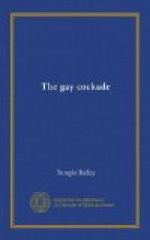“He says that no evil can teach you while you wear the beads,” Christopher told Anne.
The old man, with his eyes on her intent face, spoke again. “What you think is evil—cannot be evil,” Christopher interpreted. “The gods know best.”
They moved toward the inner tent.
“Are you tired?” Christopher asked. “We don’t have to stay.”
“I want to stay,” and so they went in, and presently with a blare of trumpets the great parade began. They looked down on men and women in Roman chariots, men on horseback, women on horseback, on elephants, on camels—painted ladies in howdahs, painted ladies in sedan chairs—Cleopatra, Pompadour—history reduced to pantomime, color imposed upon color, glitter upon glitter, the beat of the tom-tom, the crash of the band, the thin piping, as the white-turbaned snake-charmer showed in the press of the crowd.
Christopher’s eyes went to Anne. She was leaning forward, one hand clasping the silver beads. He would have given much to know what was in her mind. How little she was and how young. And how he wanted to get her away from the thing which hung suspended over her like a keen-edged sword.
But to get her away—how? He could never get her away from her thoughts. Unless....
Suddenly he heard her laughing. Two clowns were performing with a lot of little dogs. One of the dogs was a poodle who played the fool. “What a darling,” Anne was saying.
There was more than they could look at—each ring seemed a separate circus—one had to have more than a single pair of eyes. Christopher was blind to it all—except when Anne insisted, “Look—look!”
Six acrobats were in the ring—four men and two women. Their tights were of a clear shimmering blue, with silver trunks. One could not tell the women from the men, except by their curled heads, and their smaller stature. They were strong, wholesome, healthy. Christopher knew the quality of that health—hearts that pumped like machines—obedient muscles under satin skins. One of the women whirled in a series of handsprings, like a blue balloon—her body as fluid as quicksilver. If he could only borrow one-tenth of that endurance for Anne—he might keep her for years.
Then came Pantaloon, and Harlequin and Columbine. The old man was funny, but the youth and the girl were exquisite—he, diamond-spangled and lean as a lizard, she in tulle skirts and wreath of flowers. They did all the old tricks of masks and slapping sticks, of pursuit and retreat, but they did them so beautifully that Anne and Christopher sat spellbound—what they were seeing was not two clever actors on a sawdust stage, but love in its springtime—girl and boy—dreams, rapture, radiance.
Then, in a moment, Columbine was dead, and Harlequin wept over her—frost had killed the flower—love and life were at an end.
Christopher was drawing deep breaths. Anne was tense. But now—Columbine was on her feet, and Harlequin was blowing kisses to the audience!




